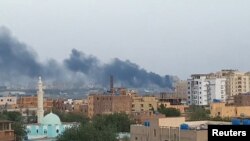U.S. Secretary of State Antony Blinken renewed his call for a truce and a return to negotiations during a meeting of the Group of Seven wealthy nations in Japan on Monday.
“People in Sudan want the military back in the barracks,” he said. “They want democracy. They want the civilian-led government, Sudan needs to return to that path.”
UN Secretary-General Antonio Guterres called on Sudan's army chief Abdel Fattah al-Burhan and his deputy, Mohamed Hamdan Dagalo, Monday to "immediately cease hostilities, restore calm, and begin a dialogue to resolve the crisis."
Guterres said "any further escalation" of the conflict between the army and paramilitary forces led by rival generals "could be devastating for the country and the region."
As the fighting showed no sign of abating, Dagalo took to Twitter to call for the international community to intervene against Burhan, branding him a "radical Islamist who is bombing civilians from the air".
"We will continue to pursue Al-Burhan and bring him to justice," said Dagalo, whose RSF and its predecessor the Janjaweed in Darfur have previously been accused of atrocities.
"The fight that we are waging now is the price of democracy," he said.
In his only statement since the fighting flared, Burhan told Al Jazeera on Saturday that he was "surprised by Rapid Support Forces attacking his home" and that what was happening "should prevent the formation of forces outside the army".
United Nations chief Guterres said "any further escalation" of the conflict between the army and paramilitary forces led by rival generals "could be devastating for the country and the region."
Along with the U.S. secretary of state and the U.N. secretary-general, calls for an end to fighting also came from the EU foreign policy chief, the head of the Arab League and the head of the African Union Commission.
Explosions rocked the Sudanese capital Khartoum Monday as fighting between the army and paramilitary forces led by rival generals raged for a third day with the death toll surpassing 100.
The intense conflict, which has seen air strikes, tanks on the streets, artillery fire and heavy gunfire in crowded neighborhoods both in Khartoum and other cities across Sudan, has triggered international demands for an immediate ceasefire.
Amid wide appeals by medics for safe routes to move casualties, the two sides agreed to a UN proposal for a window on Sunday to evacuate the wounded, but the heavy gunfire did not stop.
The World Health Organization warned that "several" of Khartoum's nine hospitals receiving injured civilians "have run out of blood, transfusion equipment, intravenous fluids and other vital supplies".
U.N. Special Representative Volker Perthes, who is in Khartoum, said he was "extremely disappointed" by the failure of both sides to abide by the humanitarian pause.
The violence has forced terrified Sudanese civilians to shelter in their homes with fears of a prolonged conflict that could plunge the country into deeper chaos, dashing hopes for return to civilian rule.
The clashes, which have also spread to other parts of Sudan, are the first such outbreak of violence in the capital in recent decades and pit the armed forces against the powerful paramilitary Rapid Support Forces (RSF). Leaders of the two sides hold the top two positions on Sudan's ruling council.
A protracted power struggle raises the risk of Sudan falling into civil war four years after long-ruling autocrat Omar al-Bashir was toppled in an uprising, as well as derailing internationally-backed efforts to launch a civilian transition that was due to be signed earlier this month.
This report was sourced from Reuters and Agence France-Presse.
